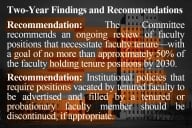You have /5 articles left.
Sign up for a free account or log in.
Purdue University, like most colleges and universities, evaluates faculty members up for tenure on their accomplishments in research, teaching and service. And as is the case at most research universities, research has tended to be prominent.
But university administrators told the Purdue board last week of plans to make significant changes in those criteria. On top of them all in the policy -- coming first in the policy to signal overarching importance -- will be an expectation that faculty members are active mentors to undergraduates, especially to at-risk students. And teaching evaluations will feature two new measures: commitment to involving undergraduates in research and to pedagogical innovation.
Taken together, the new criteria represent a move to shift priorities in tenure reviews, said Deba Dutta, provost at Purdue, in an interview Saturday.
"It is putting the student experience and student success at a higher level than most universities do," Dutta said. "We are a research university," he said, but research universities need to be producing new scholars to promote new scholarship, and to stop separating the student experience from the promotion of research excellence. The student experience must be central, he said.
Dutta said board members had encouraged this approach and, at his request, agreed to hold off on finalizing the changes until the next meeting so he could first consult with faculty members.
When that happens, Dutta may run into opposition, to judge from initial faculty reaction.
Why Mentoring Matters
Dutta said that the mentoring requirement would be in a paragraph introducing all of the criteria -- and would be a separate consideration, not just combined with one of the other areas of teaching, research and service. He said that faculty members would need to work with administrators to define how mentoring undergraduates would be measured.
And he said that there would need to be many ways to measure mentoring, as it might look different in a science and engineering program (where many professors build relationships in their laboratories) than in a humanities, arts or social sciences program. He also said that some of Purdue's professional schools have few undergraduates, and so would need to adjust the criterion appropriately.
Mentoring reviews, however they are developed, will be "prominent" in tenure decisions, he said.
Undergraduate research and pedagogical innovation won't be required, Dutta said, and they may not be appropriate for every faculty member in every department. But he said that by adding these as explicit parts of the teaching portion of tenure reviews, those junior professors who are engaged in these activities will be rewarded.
"In an era in which there is competency-based education, online education, flipped classrooms, it's important to encourage faculty to participate," Dutta said.
Trustee interest in the idea that Purdue needs to focus on mentoring of undergraduates grew out of surveys conducted by Gallup of college graduates nationally and of Purdue alumni in particular. (Disclosure: Gallup conducts surveys of administrators and faculty members for Inside Higher Ed, but Inside Higher Ed plays no role in the Gallup surveys of alumni.)
Nationally, Gallup found that a key measure of whether alumni are engaged in their jobs is whether they remember having had a professor who cared about them, made them excited to learn and encouraged them to follow their dreams. But only 14 percent of alumni nationally remember having a professor who did all of those things.
Purdue has been a key proponent of the Gallup work, and the results are called the Gallup-Purdue Index. While Purdue alumni were found to be doing quite well compared to the national sample in many areas, this was not the case with regard to mentoring. Gallup found that Purdue graduates are less likely than the national sample (17 percent vs. 21 percent) to say that they had professors who cared about them or (17 percent vs. 20 percent) to say that they had a faculty mentor who encouraged them.
Dutta said that these results showed that Purdue had "room to improve" and that he hoped making mentoring central to tenure reviews would be a step in that direction.
'A Travesty'
David A. Sanders, vice chair of the Faculty Senate and associate professor of biological sciences, said via email that while it appears that the faculty will be consulted on this idea going forward, that has not been the case thus far. And Sanders said that there are many problems with this approach. "Using the results of the highly flawed Purdue-Gallup Index for the determination of any policies is a travesty," he said.
Sanders is very much pro-mentoring. In 2004, he was named the outstanding mentor of 2003-4 in the Siemens Westinghouse Competition in Math, Science, Technology for his work with a high school student.
But he said he didn't accept the findings as valid. "Purdue and Gallup cherry-pick the results to fit a preexisting agenda. The Gallup questions are largely decades-old warmed-over queries that are designed for businesses," Sanders said. "In the Gallup poll one of the major criteria for life success is that one has a close friend at work. It can hardly be the responsibility of an institution of higher learning to ensure that outcome."
Further, Sanders noted that the Purdue results showed that his university's alumni are more likely than the national sample to be working full-time, working in managerial or executive roles, to report being engaged in work, and to be satisfied with their lives.
"If you have followed the results of the survey it was first found that students who felt 'mentored' were more successful in life than those who were not (no evidence of cause and effect -- maybe those who were receptive to mentoring are more likely to be successful or maybe those who have a more positive attitude [including towards their college experience] are more successful?)," Sanders wrote. "However, Purdue students were more likely to be in the highly successful categories than the average college student, and yet a lower percentage said they had been mentored. So we have happy poorly mentored students (according to our president). Did that bring into question the correlation? No."
The Push to Improve
Brandon H. Busteed, executive director for education and workforce development at Gallup, said via email that Gallup has not recommended anything about tenure based on its survey findings, but that colleges with which Gallup works are "thinking about and pursuing any number of changes based on the findings … from ramping up connectivity between academic courses and jobs/internships to starting new alumni-to-student mentoring programs to creating new value statements about student-centered learning, etc."
Busteed defended Gallup's methodology and said it was not designed for business only. "The constructs we are measuring in the study are perhaps the most validated items and instruments of any research in history," he said. "On both workplace engagement and well-being, Gallup has studied these elements for decades. The measures on workplace engagement have not just been measured in business -- but across all organizations, from government agencies to large nonprofits to school districts and universities to Fortune 500 companies."
As for Purdue, Busteed said it was correct that the university looks strong on a number of measures, but he said that wasn't the only point to consider. "Purdue graduates do indeed look better than the national aggregate on some of the key outcome measures," Busteed said. "But whether they look good, bad or indifferent, the only important thing to do is to continually improve. And of all the things Gallup studied, the item that most correlated with workplace engagement and well-being later in life -- the most important factor of all -- was whether a graduate strongly agreed they had a mentor who encouraged their goals and dreams. So the idea of providing more encouragement, reward, incentive and emphasis on this – for faculty, staff, alumni and even students and parents -- is a very smart idea. Certainly tweaks to tenure can reinforce this -- in addition to any number of other initiatives, such as building a network of alumni to mentor current undergraduates. From the perspective of Gallup’s research, we certainly applaud Purdue’s ideas on this."








